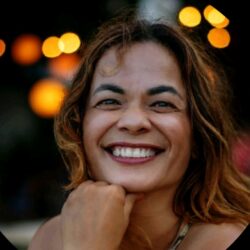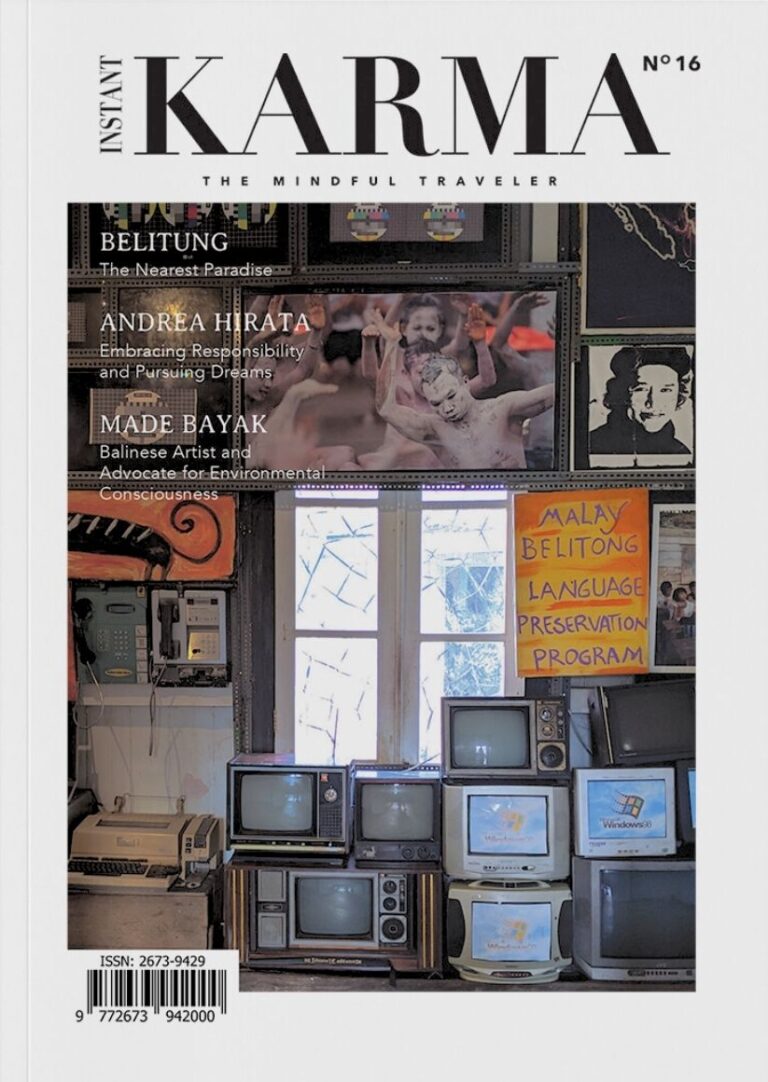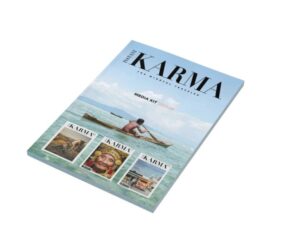Andrea Hirata became a renowned Indonesian author from the depths of discrimination and poverty through his seminal book Laskar Pelangi – “The Rainbow Troops”, which tells the story of his childhood in Belitung, where education was scarce and corporate oppression loomed large.
“The Rainbow Troops” has been translated into over 30 languages and adapted into a movie.
It became the most-viewed Indonesian film of all time, being seen by 5 million viewers during its theatrical run, further increasing the global awareness of Belitung’s cultural heritage.
Hirata is not only a best-selling author
He is also known for his contributions to the cultural heritage of Belitung Island. In 2009, he established the Museum KATA Andrea Hirata, which showcases the rich cultural and historical heritage of the island. The museum also serves as a center for promoting literature and the arts.
In this interview, Andrea shares his journey, struggles, and advice for those pursuing their dreams.
How did you face challengesas portrayed in your book Laskar Pelangi?
Learned helplessness was the biggest challenge for my childhood friends and I. Discrimination – like I described in The Rainbow Troops – imposed by the tin mining company – was so great that it created a hegemony in our culture and the driving force in our social life.
It resulted in low self-esteem, distrust, and sentiment among us natives who believed that something progressive and prosperous would never belong to us.
We thought that we did not have the capabilities to learn and be educated. We were labeled as coolies, our future was inevitable, and everyone would become a tin miner, like all the men in our village, generation after generation. Education was never part of our plans.
In your book Laskar Pelangi, the story revolves around discovering one’s own abilities and potential and facing life’s obstacles and challenges.
How did you discover your potential?
Through instinct, courage, and a positive attitude. Our community was so isolated and uneducated back then. We didn’t even know that a company exploiting our natural resources – especially a state-owned company – has a corporate social responsibility.
We were unaware that our basic human rights, such as access to education, were being violated. My instincts told me that something was very wrong. That is one reason why I wrote my first novel.
I remember when I was 16 years old, I left my home village for Jakarta and took odd jobs there, manning stores and as a factory worker. I remember sitting down one night and starting to type.
Without realizing it, after three weeks, I had written 800 pages. I had never written a short story before. That’s my first novel, The Rainbow Troops. This is not because I am such a brilliant writer but because I had so many things to talk about from my childhood and how we were mistreated by the authorities, including the state-run enterprise.
My writing was driven by my pure intention to tell everyone that what happened to us on Belitung Island at that time should not happen again. But you know what? It’s still happening in a lot of corners of the world.
Life is an exciting journey full of adventures that bring us challenges.
In Laskar Pelangi, the story is about unity, determination, and support so everyone can achieve their dreams.
For those who have not yet read your books, what is your best advice for pursuing and achieving your goals and dreams?
Take responsibility, that would be my advice. I believe that taking responsibility is the root of all virtues. Learning is easy, but one can only achieve something if you are responsible for the future, for the good things you can do, for the good you can give to others, for the opportunities you have, and for everything you are given, including talent.
When you’re away from Belitung, what do you miss the most?
I miss my friends from school, my teachers, the people at the coffee shops, the whole family, and Malay music.
Do you have a favourite spot in Belitung that few people know about?
We live in a more and more symmetrical world. What one knows, the other knows in a split second. It’s a boring world without secrets, haha! Landscape tourism is still the master everywhere.
But the typical Malay coffee stalls in East Belitung provide a fascinating cultural destination and are rarely visited by tourists. Or maybe you’re interested in seeing the Andrea Hirata Words Museum, Indonesia’s first literary museum, opened in 2009 in East Belitung.
How has Belitung transformed over time, and has the success of Laskar Pelangi impacted the changes?
The impact of Laskar Pelangi has been significant in Belitung. Tourism has increased by 1800% – Maybe it’s because of the novel and also because the story of the beauty of the island of Belitung has been made into a movie. Access to education is better now, and the novel’s criticism of the state company has enhanced corporate social responsibility.
Can you share a little more about your literary museum in Belitung?
In 2009, I established the Andrea Hirata Museum Kata in my village in East Belitung to encourage interest in reading among young people in Belitung in particular, and Indonesia in general. Inside is a library and a literary museum with one of the largest collections of Malay literature.
What is your definition of responsible tourism, and how is it best practised in Belitung?
I think in Belitung or anywhere else, tourism is an ideal way to engage the heart and mind. Tourism promotes and preserves culture and provides education and enlightenment while being enjoyable.
Any advice for people who live in remote areas and want to be a writer?
Read and have the courage to try new things and dare to answer all challenges.
Every creation has its destiny, just write it.
The future belongs to the brave.
I don’t have a background in education or in writing, and I’m not a writer with much experience. An Australian newspaper called me an accidental writer, I kind of agree with that.
As an Indonesian writer, is it important to involve cultural elements and traditions from the writer’s place of origin?
It’s very important. Unfortunately, cultural and educational themes are rather rare for Indonesian writers. Mostly, they are more interested in lifestyle themes and urban issues.
Which themes do you find fascinating and why?
Education, that’s my main topic. When I was a child, Belitung Island supplied most of the world’s need for tin. Yet, Belitung’s Malay children went to a school so poor and crooked it could collapse at any time – we were nervous every it rained, and the wind blew.
Education has become a very personal thing.
Do you have any advice for aspiring writers who are just starting?
I recommend reading as much as possible, being bold in writing, and experimenting with different genres and styles. Don’t worry about being perfect, and don’t compare yourself to other writers. Every writer has a unique voice and style, and developing that takes
time and practice. Also, don’t be afraid to seek feedback and critique from others, as it can help improve your writing.
What are your favorite books and authors?
I have a lot of favorite authors, but some of my heroes include Truman Capote, Antonio Skarmeta, Jane Smiley, John Barrend, Harper Lee, and James Allan McPherson. Capote’s In Cold Blood and Hemingway’s The Old Man and the Sea are my all-time favorite books.
Capote’s ability to write compelling non-fiction is awe-inspiring, while Hemingway’s simple yet powerful writing style always resonates with me.
Are you working on any projects currently?
A few months ago, I was inspired by my first short story, “Dry Season,” published by Washington Square Review Literary Magazine, NYU. Now I am writing my first short story collection.
Thank you, Andrea, for the interview.
We look forward to more inspiring books from you.
Get Laskar Pelangi “The Rainbow Troops” by Andrea Hirata
Follow on IG @hirataandrea









